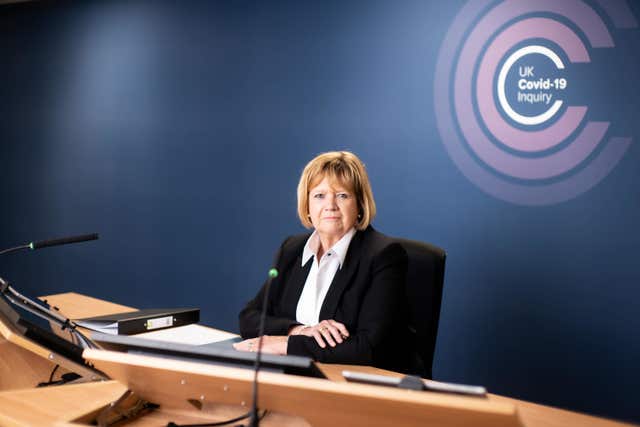Boris Johnson’s notebooks could be withheld from the former prime minister to stop him from handing over unredacted documents to the Covid inquiry, Government lawyers have appeared to suggest.
Inquiry chairwoman Baroness Hallett had given the Government until Friday to set out its position on whether it would submit the pandemic leader’s WhatsApp messages, notebooks and diaries uncensored to her investigation.
Ministers are challenging her request for the materials in the courts but lawyers for the probe have suggested Mr Johnson’s co-operation with the UK Covid-19 Inquiry, which he set up when in Downing Street, meant it was likely to see the unredacted documents before a judicial review is heard at the end of the month.
But in a letter to the inquiry on Friday, a Government lawyer said it would “not be appropriate” to take steps that were “not consistent with the very position that it has raised in the judicial review”.
The Cabinet Office has said some of the information requested by Lady Hallett, a retired senior judge, does not relate to the Government’s handling of coronavirus and is “unambiguously irrelevant”.
Keith Hugo KC, counsel for the inquiry, said at a preliminary hearing on Tuesday that a request had been made for Mr Johnson’s pandemic notebooks to be returned to him by Monday June 12 with a view for them to be inspected by the investigation team.
But Parm Sahota, writing on behalf of the Treasury solicitor, said Mr Johnson — who dramatically resigned as an MP on Friday — took a “different position” to the Government and that it did not support handing over unredacted documents to the inquiry.
It raises the possibility that the Cabinet Office could choose to hold onto Mr Johnson’s notebooks until the High Court challenge has concluded and potentially for longer if judges decide in ministers’ favour.
“We are aware of Mr Johnson’s public comments on sharing information with the inquiry and, for his own reasons, he takes a different position to that of the Cabinet Office,” the lawyer said.
“However, we consider that it is not appropriate for the Government to have to take steps that are not consistent with the very position that it has raised in the judicial review – and that would be the position were the Cabinet Office to provide unambiguously irrelevant material to Mr Johnson in the knowledge that he intended simply to provide it, without protection, on to the inquiry.”
Mr Sahota added: “In relation to the diaries, I can confirm that these documents are Cabinet Office documents produced to record the engagements of the prime minister.
“The diaries are not Mr Johnson’s personal diaries.”
The letter was published by the Cabinet Office only hours before Mr Johnson announced that he was quitting as an MP following what he called a “witch hunt” inquiry by the Commons Privileges Committee into whether he misled the Commons over lockdown-busting parties held in No 10 during the pandemic.
The Government Legal Department said neither the WhatsApp messages on Mr Johnson’s current or his old phone, which was locked for security reasons, would be sent unredacted to Lady Hallett’s team.
Messages relating to the ordering of three coronavirus lockdowns in 2020 are likely on a phone Mr Johnson stopped using in May 2021 after it emerged his mobile number had been available online for 15 years.

Mr Sahota said the Cabinet Office “continues to work with security partners and Mr Johnson’s representatives” to assess the security issues on the device with a view to “retrieving the appropriate material”.
But he said, even if the department does gain access to the messages, the unredacted contents would not be passed on, pending the result of the judicial review.
The senior solicitor said ministers did “not consider that the inquiry’s work is likely to be materially disrupted by our position as set out above”.
He noted that redacted copies of Mr Johnson’s notebooks, diaries and WhatsApp messages from Mr Johnson’s “new” phone had been submitted as evidence.
Lady Hallett is due to hear evidence from witnesses for the first time next week, with public hearings taking place in central London from Tuesday.
Six weeks of hearings are planned for the first module of the inquiry, which will focus on resilience and preparedness.
The second module, with evidence scheduled to be given in the autumn, will look into Government decision making during the pandemic, with Mr Johnson’s evidence likely to be heavily relied upon.
You may also like: Johnson fires parting shot at Sunak, urging Tory party to ‘recover its mojo’

